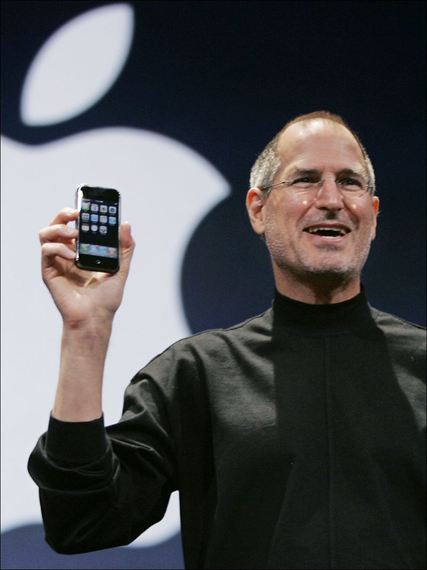What does Don Draper and Steve Jobs have in common and why does it matter?
It should matter to you if you own or plan to purchase shares in Apple Inc.
And it should matter to Apple CEO Tim Cook, if he wants to prove his critics wrong that the best days of Apple are behind it.
It's time for Tim Cook and his team to do some soul-searching despite Apple's success.
Everyone knows Steve Jobs, co-founder and former Apple CEO, who passed away on Oct. 5, 2011. Besides his incredible emphasis on focus and simplicity, he was also a creative genius and most importantly a visionary leader.
On the other hand, not everyone will know who Don Draper is. He is an advertising genius at the New York ad agency Sterling Cooper & Partners in the critically acclaimed AMC American television drama series Mad Men.
Both companies -- Don Draper's fictional ad agency Sterling Cooper & Partners and Steve Jobs' Apple -- believe that everything is just fine without the marketing geniuses of the two visionary leaders shaping their companies future.
Of course at Apple, the choice is not anymore theirs, since Steve Jobs is dead.
Whereas Don Draper is alive but just not anymore needed or wanted at his firm (Mad Men season 7 episode 4, "The Monolith") regardless of his advertising genius.
Both are very much needed at their respective companies. Both men made their companies great. Both men have something that you cannot bottle but it so important to the success and future of their companies.
That is the common thread between Don Draper and Steve Jobs.
Don Draper made his advertisement (ad) agency great by producing great ad campaigns for its clients.
Steve Jobs made Apple great by giving us great product categories such the iPod, iPhone, iPad and Apple's intuitive user experience.
If companies fail to provide its customers with what they used to expect from them and beyond, with other words, if they fail to keep doing what made them great in the first place they are doomed to fail.
Despite Apple's strong earnings, huge cash reserves of $150 billion, buyback program, and stock split (7-1) seem at first glance as great news they might just disguise problems beneath it.
To better understand Apple's potential problem we use the metaphor of a car rolling down a hill.
How can you determine the reason(s) for the speed of a car rolling down a hill? Can the car speed be explained due to the slope of the hill, or due to a combination of the slope and the current or previous car speed?
With other words can Apple current success be explained through its past strategic initiatives and successes, or through its new strategic initiatives, or a combination of both? The answer might shed some light on Apple's capability to keep producing strong numbers and coming up with great product categories and ideas in the future.
Without new innovative, game-changing products, Apple might just be a car rolling down the hill with some impressive speed, but nevertheless no much gas left in the fuel tank.
The Apple brand is still very strong, but we are missing Steve Jobs who made people and investors dream of wonderful inventions to come next from Cupertino.
The final proof is in the (Apple's) pudding. We will have to wait until Tim Cook reveals the next product category. However some investors will not wait to taste the pudding, or hear the news of a new product category announcement. As the old stock market saying goes: "Buy the rumor, sell the news."
Apple's potential acquisition of Beats Electronics, the premium consumer headphones maker and streaming music subscription service, for $3.2 billion, might just be a further strong indication that Apple has lost its way since Steve Jobs' death.
The stock price is not the reflection of the present, but of the future to come. So if we believe that Apple lost its innovation mojo, then it is only a question of time before the stock price will correct itself.
Steve Jobs was able to make us all believe in his vision that there will be a better future with great new products still to come from Apple.
Many believe that Tim Cook does an excellent job, but can he do Steve's job(s)?
Tim Cook is very much needed at Apple, but he needs also Steve Jobs' visionary leadership. The truth is that they both needed each other to shine. As Aristotle said: "The whole is greater than the sum of its parts."
Everybody is replaceable, so they say but great and exceptional people are not easily or at all replaceable. Great employee and leaders such as the late Steve Jobs define a business, much more than its products or technology.
"If your actions inspire others to dream more, learn more, do more and become more, you are a leader." -- John Quincy Adams
Finally, we come back to why it matters what Don Draper and Steve Jobs have in common.
You can lead the ad agency Sterling Cooper & Partners without Don Draper. You can lead Apple without Steve Jobs. However, in both cases you will need to replace them with someone who can (with obviously their own personal leadership style and vision) bring back what made the company great in the first place.
What makes a company great will obviously differ from company to company but the time will come when we know the truth if the management truly knew.
Maybe the solution of how Apple could get back its innovative edge can be found in Steve Jobs' inspiring 2005 Stanford commencement address.
If Apple wants to stay relevant for the future to come it should reflect on Steve Jobs' words that closed his speech.
"Stay hungry. Stay foolish."


